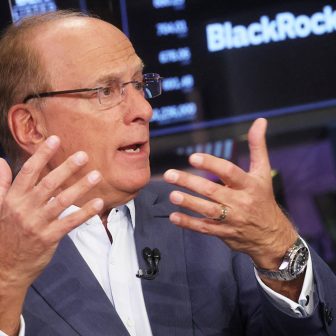Kenneth Hayne has ended his task as royal commissioner with impressive restraint. Confronted by an appalling culture of exploitation of customers by banks and other financial institutions, laid bare in heartbreaking evidence to the commission’s hearings, he proposes just one big reform to our financial system, buttressed by exhortations and subtle changes aimed at reforming that culture.
Whether it is enough to turn greedy banks into good citizens, only time will tell. For reasons beyond Hayne’s control, one can’t be optimistic. Australia’s four major banks form a de facto cartel that is extremely powerful and without serious competition. By and large, businesses and households who need to borrow money have nowhere else to go.
It may be, as RMIT University’s Andrew Linden and Warren Staples argue, that we will need another royal commission in ten years’ time to open the way for more far-reaching structural changes. But it is not clear what those changes might be, whether there is strong demand for them, or whether an appetite exists on either side of politics for doing much more than Hayne proposes.
Hayne and his team have already taken us a long way. Remember that just two years ago, the Coalition and its media echo chamber routinely dismissed calls for a royal commission as “bank bashing.” John Howard was even sillier, calling it “rank socialism.” You don’t hear that anymore.
The first great achievement of the commission was to put the facts about the way banks have behaved out there before the public in a manner so stark that nobody could defend them. It showed us that these examples of exploitation were not accidents, or administrative errors, but the result of a system-wide culture of corporate greed in which responsibility to customers was brushed aside to maximise profit.
Thousands of victims of financial malpractice made submissions to the commission. Hayne has been criticised for inviting only twenty-seven of them to give evidence in public hearings, but he was surely right that they had got their message out, and it was time to move on to repairing the damage.
The short-term impact on the banks’ reputation has been devastating. In public, their dismissal of any criticism gave way to confession and apparent contrition. It has created a political environment in which reforms are possible at last.
One can argue that Hayne could have been bolder. Several of his seventy-six recommendations are to retain the status quo. He rejects calls to give small-business borrowers the same consumer protection as households. Rather than forbid banks to own financial advice firms, as many advocated, he proposes that advisers employed by banks be required to inform clients in writing of that fact.
While he is sharply critical of the way the banks calculate their executive and staff remuneration, he does not criticise the extraordinary level of that remuneration, which has been a pacesetter for the obese levels of executive remuneration throughout the economy.
Nothing in this report will threaten the four banks’ dominance of Australian finance. The surgery Hayne proposes is to be performed with a scalpel, not a chainsaw.
He certainly could have — in my view, should have — explored how the Abbott government’s deep cut in funding for the Australian Securities and Investments Commission in the 2014 budget affected its willingness (and ability) to launch legal actions against miscreant banks with unlimited resources to fight any charges.
An outgunned ASIC has had some bad experiences in the courts. Its record of inaction against the banks is easy to criticise, and Hayne does so, accusing it of seeing the banks as “clients” and punishing them with press releases rather than prosecutions. All true, but a realist must recognise that inadequate funding has limited its choices.
ASIC chief James Shipton told the commission that his organisation is “woefully underfunded.” Although the business environment it polices has grown enormously since 1991, its staff has grown by just 14 per cent. Yet, just last May, Scott Morrison’s final budget proposed cutting its funding by $41 million a year over the four years to 2021.
That has changed since Shipton gave evidence. And on Monday treasurer Josh Frydenberg announced that the former chair of the Australian Competition and Consumer Commission, Graeme Samuel, will carry out a capability review of the banks’ financial regulator, the Australian Prudential Regulation Authority, to ensure it has the resources to do its job.
The lesson is clear: if we want our corporate regulators to be tough cops on the beat, we have to resource them properly. Even Labor has been reluctant to do that. In opposition in 2007 it also proposed cutting ASIC’s funding. Unlike the Coalition, it dropped that idea once it got into office, but it did little to increase the regulator’s resources in its six years in power.
One thing that will decide if this royal commission makes a lasting change, or merely a transient one, will be whether our next government gives ASIC and APRA the resources they need to fight and win cases in the courts.
This is a conservative report, in the best sense of the word. Hayne has not set out to reinvent banking, or to do what the banks’ regulators should be doing, or to propose his own blueprints to solve every issue before him.
He has focused on the things he believes matters most — above all, changing the culture of the banks to give priority to serving customers’ needs as well as making money, and resolving the conflicted interests of mortgage brokers.
The last is the big change his report proposes. It is also the recommendation that now faces most resistance.
Back when the Gillard government tried to resolve the conflicts of financial advisers, mortgage brokers were left out of the reform. The legislation we ended up with was severely watered down by the Coalition, “grandfathering” the existing conflicts of interest of advisers who worked for the big banks, and exempting retailers such as car dealers who sell insurance to their clients.
Urged on by Treasury, Hayne has called for government — which will almost certainly be the government we elect in May — to sort out the mess by applying the same rules to financial advice across the board. And the key rules are that a mortgage broker or financial adviser must work in the best interests of the client, and be paid by the client, rather than (as now) by commissions from those whose products he/she sells.
Hayne put it trenchantly. “The interests of client, intermediary and provider of a product or service are not only different, they are opposed,” he wrote. “An intermediary who seeks to ‘stand in more than one canoe’ cannot. Duty (to client) and (self) interest pull in opposite directions.”
He dismissed the hope embodied in current legislation that such conflicts should be “managed.” “Experience shows that conflicts between duty and interest can seldom be managed,” he countered. “Self-interest will almost always trump duty.”
Hayne lines up with Treasury in arguing that by simplifying the law to impose the same rules on all those offering financial advice — including compulsory registration, as well as banning commissions — you make advisers focus on what the law expects them to do, rather than try to find ways around it.
The mortgage brokers are not taking that lightly. They are warning loudly that scrapping commissions would put them out of business — and that the ultimate impact of that would be to strengthen the oligopoly of the big four banks, reduce competition, and hence give the banks more room to raise interest rates.
The brokers and their supporters argue that if intending homebuyers have to pay $2000 or more for using a mortgage broker, they simply will not do it. Instead, they will just walk through the doorway of a bank and deal directly with it free of charge — even if that means they won’t know about alternatives that would cost them less in the long term. And the banks with doorways on the street are the big four.
It’s not a negligible argument, and it’s not a bad idea to have a public debate before resolving it. Treasurer Josh Frydenberg says the government will put off a decision on mortgage broker commissions until it has brought all the financial advisers under the one legislative roof.
Similar reforms were introduced in the Netherlands after the global financial crisis, without dire consequences. The Dutch government used the sweetener of making the brokers’ fees tax-deductible. But 60 per cent of our mortgages are now written through mortgage brokers. The politicians will need to go out and explain to homebuyers why in future they will have to pay for a service they now get for free.
That aside, Hayne’s report really does three things. First, it trenchantly criticises the boards and senior management of the banks. Second, it proposes to induce a new culture in the financial sector that might best be called “responsible.” And third, it recommends a number of changes to fix other problem areas.
Most of Hayne’s recommended reforms, each relatively minor in themselves, collectively aim to make the banks and other financial firms more responsible in the way they deal with their customers.
Farmers would not be harassed for interest payments when a drought has frozen their income. If you walk up to a bank teller to make a deposit, he or she would not be allowed to divert you into buying an insurance or superannuation policy. APRA would work with the banks to create a remuneration system in which sales would be only one component, with other indicators to measure the quality of service.
Importantly, what is now the banking code of practice would become law. You could sue your bank if it breaches it.
I would sum it up by saying that Hayne wants the banks to be more like Bunnings.
When you walk into a hardware store and you don’t know exactly what you need, in my experience the service staff will ask the right questions, tell you what you need, and show you where it is. If you walk into a bank and you don’t know exactly what you need, you can have no confidence that the staff will tell you to do what is in your best interest. They are trained to persuade you to do what’s in the interest of the bank.
That’s the culture that has to change. We have to lift the customer service levels of the banks and the financial sector generally to match those of our hardware stores. It won’t be easy, and Hayne makes it very clear that it won’t come without direction from the top.
“There can be no doubt that the primary responsibility for misconduct in the financial services industry lies with the entities concerned and those who managed and controlled those entities: their boards and senior management,” he writes. “Everything that is said in this report is to be understood in the light of that one undeniable fact.”
Media reporting has highlighted Hayne’s sharp criticism of evidence given by NAB chair Ken Henry (whom he quaintly calls Kenneth) and chief executive Andrew Thorburn. But one suspects that what really fired him up was a report in the Australian at that time, citing an email sent by NAB management to staff urging them “to sell at least five mortgages each before Christmas.” Whatever the NAB chiefs were saying publicly, the culture within clearly had not changed.
Several of the recommendations dealing with specific problem areas relate to how banks deal with farmers in financial trouble. Hayne wants the banks’ ruthless approach of seizing land and assets and selling them to clear the debts to give way to a revival of older-style banking, in which “experienced agricultural bankers” engage in mediation — to be required by law — with the farmers to work out “the best outcome for bank and borrower.”
It’s the only area of specific lending that Hayne explores in such detail, leading some to question why farmers were singled out for such a benevolent blueprint. Why isn’t there a similar mediation path proposed for urban borrowers who lose their jobs and, largely owing to their age, become long-term unemployed?
It’s a fair question. One answer might be that the blueprint Hayne laid out for dealing with farm debts is an example of the way his vision of responsible banking should be applied throughout society.
Another is that it might be Hayne’s way of recognising the political courage of John “Whacker” Williams, the retiring NSW National Party senator without whom this royal commission would never have taken place. Williams himself had experienced rough treatment from the banks when his farm got in trouble, and he was determined to use his time in politics to set up a full-scale inquiry to ensure that others were not treated the same way.
(The ABC’s Stephen Letts has written a fascinating backgrounder relating how in 2011 Williams introduced Commonwealth Bank whistleblower Jeff Morris to Adele Ferguson, financial columnist for the Age. It began Ferguson’s public exposure of the extraordinary wrongdoings of the banks, other financial firms, and now other firms generally. I can think of no other journalist in Australia who has done so much to shine a torch into the dark corners of business practice, above all in the financial sector.)
On some other issues Hayne, probably wisely, passed the buck to those in a better position to negotiate detailed blueprints for reform. For example, he gives firm support to the principle that each of us should have one superannuation account, rather than multiple small accounts that get eaten away by service fees. But how we get there is an issue he leaves to others.
Similarly, it is left to APRA to sort out new remuneration practices with the banks. And while Hayne proposes that charges be considered against financial entities over twenty-four matters, he refers them to APRA and ASIC instead of using the commissioner’s prerogative to go straight to the DPP.
This restraint is sensible; a commissioner, however clever, is not in a position to lay down blueprints in these areas. And if you feel, as he does, that the regulators need to develop an appetite for and a habit of taking firms to court when they break the law, what better examples to begin the process than those he has perused himself in the course of the royal commission?
Hayne is clearly not dewy-eyed about what will follow from his inquiry. At one point he writes that the aim of his recommendations is to “reduce the chance that conduct of the kinds identified will happen again,” then adds more warily, “or happen again with the same effect for consumers.”
The banking oligopoly will remain an oligopoly, powerfully positioned to overcharge and exploit its customers. If this royal commission is ultimately judged to be successful, its legacy will be to change the financial sector’s culture to one that sees serving the customer well as being as important as making sales and profits.
But that can only be temporary. That culture will change again, and change for the worse. Memories are too short, and the ability to exploit customers too strong, for poor behaviour to remain suppressed forever. Hayne has told the government how to close some egregious avenues of exploitation that financial firms used in the past decade. But new ones will be discovered. It’s to be hoped that future governments will be quicker to set up an inquiry like this to shut them down. •




